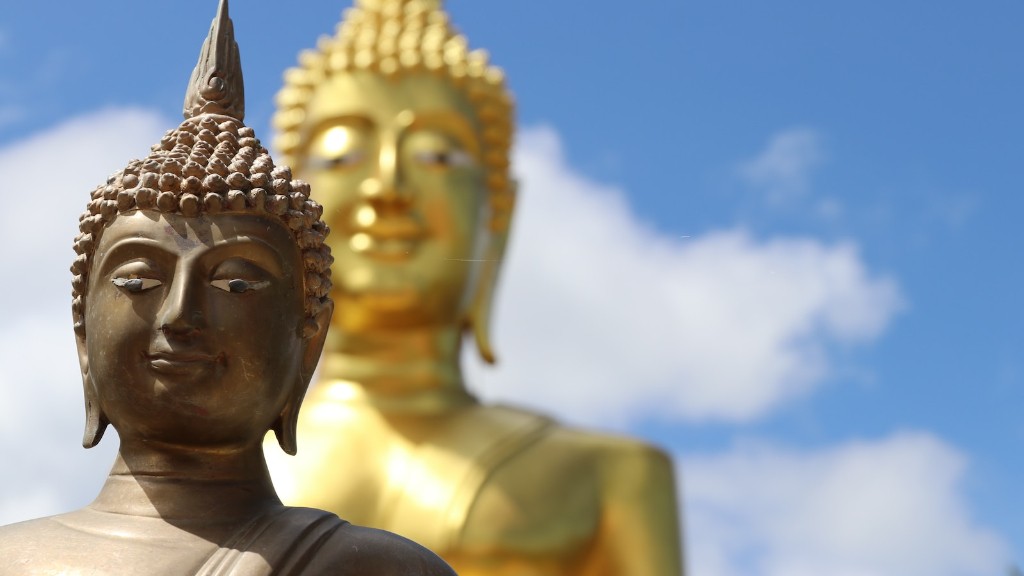Section 1: Overview and Introduction
Hinduism is one of the oldest and most complexworld religions, with adherents scattered across dozens of countries and hundreds of different aspects. Some adherents argue that Hinduism is a universal religion while others argue it is an ethnic religion. In this article, we will explore the nuances of Hinduism and examine perspectives from experts and adherents alike to better understand what makes Hinduism both universal and ethnic.
Hinduism is both a major world religion and a complextope of beliefs and practices. It is unique in its cultural, religious, and philosophical roots. Adherents, called Hindus, have their own holy books and scriptures and have a variety of gods and goddesses. There is no single founder, no single scripture, and no central authority structure. With these differing characteristics, Hinduism can be seen as both a universal who, and ethnic religion.
Although many adherents argue that Hinduism is a universal religion, there are elements that suggest it is an ethnic religion. Hinduism is closely tied to India, which is where it originated. Hinduism is heavily intertwined with Indian culture and it has been argued that its customs and traditions are deeply rooted in Indian culture. Additionally, many of the symbols and practices associated with Hinduism are associated with Indian culture.
Section 2: Focus on Universal Qualities
Despite its connections to Indian culture, Hinduism is arguably a universal religion. It is one of the oldest religions in the world, with roots that pre-date written history. Its teachings come from both ancient Indian texts and oral traditions. Its philosophical systems are based on ethical frameworks and are firmly rooted in moral laws. Its followers are scattered throughout the world, as Hinduism has been one of the most historically successful religions in terms of its expansion.
Hinduism offers a variety of philosophies that appeal to people from a wide range of cultures and backgrounds. Its teachings of karma, reincarnation, and moksha, have universal appeal and have been adopted by adherents of other religions, such as Buddhism and Jainism. Moreover, Hinduism embraces tolerance and encourages its adherents to respect the beliefs of others.
Additionally, Hinduism has faced its fair share of persecution over the years, as it has been a target for colonialism and aggression. Despite this, Hinduism remains one of the most widespread religions in the world, with over one billion adherents. Hindus are a part of everyday life and culture in the countries in which they reside, and many of its beliefs and values are respected and adopted by adherents of other religious backgrounds.
Section 3: Focus on Ethnic Qualities
Hinduism also has strong qualities that label it as an ethnic religion. It originated in India, which is why it is heavily associated with that country’s culture, traditions, and customs. Many Hindus live in India and practice Hinduism as their primary faith. Hinduism is closely tied to the caste system and has distinct rituals, traditions, and festivals associated with it that relate to India and its culture.
Additionally, many of the gods, goddesses, and images associated with Hinduism are Indian in origin, and the language used in its holy texts is primarily Sanskrit, an ancient Indian language. Furthermore, the language used in its religious ceremonies is often Sanskrit and the places of worship are usually devoted to Hindu gods and goddesses.
Moreover, many of the symbols associated with Hinduism are Indian in origin. This includes the use of ‘OM’ in Hindu prayers, which is a sacred mantra associated with Hinduism, and the use of bindis, a forehead decoration worn by many Hindu women. The use of Indian-style clothing and garb is also common amongst Hindu adherents.
Section 4: Conclusion
Overall, Hinduism is a complex and unique religion that has both universal and ethnic aspects. Many of its teachings and principles apply in other parts of the world, and it has endured despite aggression and persecution. At the same time, Hinduism is closely associated with India and its culture and has distinct rituals, traditions, and customs associated with it. In conclusion, Hinduism is both a universal and ethnic religion.
Section 5: Historical Background
Hinduism is believed to have originated in the Indus Valley civilization over 5000 years ago and its earliest scriptures, the Vedas, are among the oldest in the world. Its history is closely linked to Indian culture and its customs and traditions, as well as the philosophies of Hindu sages and ancient texts. Over the centuries, Hinduism has evolved and spread throughout the world, taking on different forms and uniting adherents from a variety of backgrounds.
Moreover, Hinduism has been heavily influenced by various other religion and cultures, particularly Buddhism, Jainism, and Islam, as well as Western culture. Thus, Hinduism as we now know it contains elements of a variety of other religions, cultures, and societies. As Hinduism spread, it has adapted to different socio-political and economic contexts, often taking on different forms and reflecting the values of the countries in which it is practiced.
Initially, Hinduism was considered to be a religion of India’s upper-caste Hindus, but it has since become more diverse and inclusive. Consequently, its beliefs and practices have spread to different parts of the world and it is now practiced in many countries.
Section 6: Philosophy and Beliefs
Hinduism is unique in its approach to philosophy and beliefs. It is not a religion that is centered around a single deity, instead it is focused on a variety of gods and goddesses. Hindus believe in karma, the idea that a person’s actions have consequences and will affect their future lives. They also believe in the law of cause and effect, which states that every action or thought has a reaction.
Furthermore, Hindus believe in moksha, which is the liberation from the suffering of rebirth. Additionally, Hindus believe in reincarnation and the cycle of death and rebirth. Hindus also have philosophical and ethical frameworks, with many adherents following the teachings of the Bhagavad Gita and the Upanishads, both ancient texts related to Hinduism.
Hinduism also has a variety of rituals and practices. These include holy days, such as Diwali, prayer, and offerings to gods and goddesses. Yoga, which is linked to Hinduism, is also widely practiced as a way of achieving physical, mental, and spiritual health.
Section 7: Popularity and Impact
Hinduism is one of the most popular and widely practiced religions in the world, with over one billion adherents. Additionally, it has had a major impact on the culture, customs, and values of many countries in which it is practiced. For instance, in India, Hinduism has been heavily linked to the caste system, which has a great influence on the everyday lives of Indians, and has created divides between groups of people. Moreover, many customs and traditions associated with Hinduism have been adopted by countries in which Hinduism is practiced.
Furthermore, Hinduism has had an impact on the religious beliefs and practices of many other religions and cultures. Buddhism, Jainism, and Sikhism, for instance, have been heavily influenced by Hinduism, with many of their teachings originating from Hinduism. Moreover, the language and symbols associated with Hinduism have been adopted by a variety of different cultures and religions throughout the world.
Hinduism has also impacted politics and economics, particularly in countries where Hinduism is heavily practiced, such as India and Nepal. Politically, Hinduism has had an influence on the form of governments and the laws governing people. For example, in India, Hinduism has influenced the caste system, which continues to shape Indian society today.
Section 8: Modern Context
Today, Hinduism is a thriving religion, with adherents spread across the world. Despite facing persecution and aggression, it has persisted and flourished. Its teachings and principles have been widely adopted by adherents of other religions, and its practices and customs can be seen in different social and cultural contexts.
Modern Hinduism has also evolved to encompass new ideologies, practices, and beliefs that have emerged over the years. Hinduism is no longer exclusively a religion of India’s upper classes and is now more accessible and open to others. Moreover, it is increasingly being seen as a universal religion, with its teachings and principles being adapted by adherents of other faiths.
Hinduism has also been increasingly embraced by Western societies. In recent years, its symbols and philosophy have been widely adopted by adherents of Western religions. As a result, Hinduism has become more popular in the West and its adherents have grown in number. Today, Hinduism is one of the largest and most influential religions in the world.
Section 9: Expert Opinions
In recent years, experts have debated whether Hinduism is a universal or ethnic religion. While some experts argue that Hinduism is a universal religion, others argue that it is an ethnic religion. According to these experts, Hinduism contains elements of both, which is why some adherents consider it to be both a universal and an ethnic religion.
Experts agree that Hinduism originated in India and is closely tied to Indian culture and its beliefs and customs. They also contend that while Hinduism offers a variety of beliefs and practices, it is heavily associated with India and its traditions. Moreover, experts agree that its symbols and practices, such as the use of ‘OM’ and the wearing of bindis, are Indian in origin.
However, experts also agree that Hinduism has qualities which make it a universal religion, such as its moral principles and ethical frameworks, that appeal to adherents from a variety of backgrounds. They also contend that Hinduism has adapted to different contexts throughout the centuries and has been embraced by adherents from various religions and cultures.
Section 10: Adherent Perspectives
Ultimately, it is up to the adherents of Hinduism to decide whether it is a universal or an ethnic religion. Different adherents have different opinions on the matter. Some adhere to the belief that Hinduism is a universal religion and that its teachings, symbols, and philosophies can be applied to adherents from any background. Others adhere to the belief that Hinduism is an ethnic religion and that its customs and beliefs are inseparable from India’s culture and traditions.
Regardless of their views, many adherents acknowledge the importance of Hinduism and its impact on the world. They recognize that Hinduism has had a major influence on other religions and cultures and that its teachings and practices are applicable to different parts of the world. Moreover, they agree that Hinduism is both a universal and ethnic religion and value its ability to unite adherents from different backgrounds.

